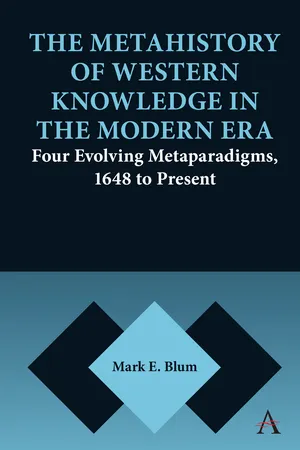
The Metahistory of Western Knowledge in the Modern Era
Four Evolving Metaparadigms, 1648 to Present
- 270 pages
- English
- ePUB (mobile friendly)
- Available on iOS & Android
The Metahistory of Western Knowledge in the Modern Era
Four Evolving Metaparadigms, 1648 to Present
About this book
The book is a study of the evolving history of knowledge in the arts and sciences in the modern era – from 1648 through the present. Modernism is treated as an epoch with evolving disciplines whose articulated problems of a time and the inquiry methods to address them, develop in a coordinated manner, given a mutual awareness.When one organizes the development of knowledge over periods of years, and gives it an appellation such as "Modernism, " the organization of facts is guided by concepts and values discerned throughout these periods. These facts of knowledge development share sufficient understandings to be called an "era, " or an "epoch, " or other terms that insist on the shared aspects of those years. One can call such an effort a "metahistory, " in that what is tracked is not merely a knowledge that is political, economic, ideological, sociological, or scientific, but an overview that tracks the respective conceptual developments of the fields in how they have changed and augmented their problem formulations, inquiry methods, and explanatory conceptions over time.
Frequently asked questions
- Essential is ideal for learners and professionals who enjoy exploring a wide range of subjects. Access the Essential Library with 800,000+ trusted titles and best-sellers across business, personal growth, and the humanities. Includes unlimited reading time and Standard Read Aloud voice.
- Complete: Perfect for advanced learners and researchers needing full, unrestricted access. Unlock 1.4M+ books across hundreds of subjects, including academic and specialized titles. The Complete Plan also includes advanced features like Premium Read Aloud and Research Assistant.
Please note we cannot support devices running on iOS 13 and Android 7 or earlier. Learn more about using the app.
Information
Table of contents
- Cover
- Half Title
- Title Page
- Copyright Page
- Contents
- Introduction
- Part I The First Modern Metaparadigm, c.1648–c.1750
- Part II The Second Modern Metaparadigm, c.1750–c.1865
- Part III The Third Modern Metaparadigm c.1860–c.1960
- Part IV The Fourth Modern Metaparadigm, c.1970–c.2060
- Conclusion
- Bibliography
- Index